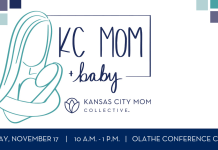I’ll just cut to the chase: COVID-19 sucks, especially if you’re pregnant (as if birth wasn’t nerve wracking enough on its own!). Beyond the base-level stress that a pandemic brings, social-distancing rules can really throw a curve ball into your birth plan, particularly if you were planning on the support of a doula.
Among other precautions, many KC hospitals are implementing the one-support-person-only rule, which can prove problematic if you were planning on having both a partner and a doula’s support during a hospital birth. Even if you’re skipping the hospital in favor of a birth center or home birth (where the same rules may not apply), you may have some questions about how social distancing will affect your doula experience.
It’s for this reason that I interviewed six doulas about what services they’re still able to offer at this time, how they’re handling social distancing, and what you can expect if you hire one to support you during your pregnancy and birth. Please note that there are dozens of wonderful, experienced doulas here in the Kansas City area—this sampling is simply meant to give you a general sense of what to expect at this time, as well as what trends the doulas are seeing.
Here are the six doulas I interviewed:
- Lauren Letterman, doula and co-founder of Welcome Baby KC
- Ashley Haden-Peaches, doula and owner of Peachy Births: Doula and Lactation Services
- Ashley Walburn, doula and owner of hOMe holistic
- Jessica Sexton, doula at hOMe holistic
- Hannah Niehues, doula and owner of Maternal Revival
- Mary Pope, doula and owner of Oh Baby! Kansas City
—
Q: What does your doula business look like at the moment, now that we are in the middle of a pandemic? What changes have you had to make?
Ashley Haden-Peaches: I work part time, so I normally take 1-2 clients per month. That hasn’t changed much since all of this started. I’m still offering doula services, but right now all my prenatal meetings are virtual. For those births that I will be attending, I will be wearing a mask. If lactation support can be accomplished virtually, we will do that; if not, we will make a plan to do an in-person visit to help through the lactation process.
Hannah Niehues: At the moment, I am taking things case-by-case, but so far all consults and prenatal meetings have been done virtually, though I’m continuing to offer in-person support during labor. For clients that I am unable to physically support during labor, I am offering virtual support, which includes FaceTime calls, talking through fears or anxieties, refreshing the partner in comfort techniques, and other measures.
—
Q: Now that some hospitals are banning all visitors except for one support person, many women are no longer able to have a doula with them if birthing in a hospital. What services are you still able to offer right now, even if you can’t attend a birth in person?
Lauren Letterman: Births do look a little different for us right now. For the day(s) of baby’s birth, we may support clients at their home in early labor, and depending on the birth facility, we will either attend the birth in person or via phone or FaceTime. We’re spending a lot more time with our clients via phone, text, and FaceTime, especially postpartum when we’re still on call for reassurance or guidance, even at 2 a.m. Our relationships with maternity care providers and administrators have been a lifeline in this hot mess. No wild rumors or unexpected policy changes to disrupt birth plans!
Hannah Niehues: During this time, doulas are more valuable than ever. This time is filled with anxieties and ever-changing research and recommendations. While a portion of doula support is in-person during labor, that is only a piece of what a doula does. Even in these unprecedented times, asking parents the right questions allows them to realize what they want out of their birthing experience. Doulas can also give parents the knowledge and tools to feel equipped to go through the process of birth and come out feeling empowered.
—
Q: Are more people considering home births right now? Do you attend home births?
Ashley Walburn: Yes, so many! A couple of weeks ago, we had a mother switch to home birth the day before her due date, and she had her baby safely at home. She was planning a hospital birth until COVID restrictions felt more overwhelming than home birth, and she made the switch. Many are switching to home and birth center births so they can have both their partner and doula at their birth.
Hannah Niehues: I think people who had thought about home birth before are considering it now. For most people who were planning a medicated hospital birth, jumping to a home birth is a significant shift. Some have changed to a birth center, which is a great option as well for low-risk mothers who are wanting an unmedicated birth.
—
Q: If you do attend home births, how do you handle that as far as social distancing is concerned? (Example: maybe you come to people’s homes but wear a mask and stay six feet away at all times, etc.)
Jessica Sexton: Our clients expect physical support: massage, hand holding, and counter pressure, so we are not social distancing during labor and birth. We have masks, and wrap up and set aside clothes as soon as they come out of the dryer so they stay as clean as possible. Before leaving for a birth, we shower, and try to either leave the house immediately after getting dressed or change in their garage to ensure as much cleanliness as possible.
Mary Pope: When there is not a global pandemic, all of our doulas always practice the recommended hand washing protocol, shower immediately before going to a birth if possible, always wear fresh clothes, and if they or a family member has been running a fever in the past 24 hours, we call our backup. Now with COVID-19, if they or a family member runs a fever at all, they realize that that means they “tap out” for a week at least to see if any other symptoms show up. They are also wearing masks and covering their hair with a scarf or cap.
—
Q: What does the birth center experience look like right now? Are birth centers also practicing the “one-support-person-only” rule that hospitals are observing?
Ashley Haden-Peaches: New Birth Company is currently only restricting the support persons to two. They understand how vital support people are to the birthing process and are still open to having doulas present at births as the second support people. They are asking all professional support people to wear masks.
Jessica Sexton: The birth center experience is mostly the same. They allow only two support people and require them to wear masks, but not the laboring person. Everyone must pass a questionnaire screening before entering. Other than that, it’s exactly the same experience.
—
Q: Is there anything else that you think pregnant clients would like to know right now? Please feel free to include positive words of encouragement, and hope for the future!
Lauren Letterman: Having a baby in the middle of a pandemic sounds like the hero’s plotline for a dystopian adventure story! Growing your family right now might feel exciting, confusing, scary, and amazing all at the same time. Create a birth team that you trust, and do what you can to plan, prepare, and enjoy your pregnancy and postpartum. It may be different than you had imagined, but it can be pretty wonderful, too.
Ashley Haden-Peaches: I think it’s important for people to know that it is okay to grieve the things that you are missing: the baby shower, the maternity photos, the extra support during delivery, the general inability to have a fairly normal pregnancy experience. It’s okay to be sad about these things. If you are, make sure you have someone to talk to. A doula can provide some direction in finding the right person for that conversation (if it is not the doula).
Ashley Walburn: All births are unpredictable. This is a hard time for pregnant families and whatever choices you make for your family are your decision. When you know all of your options, and have all the information available, you will be able to make the most optimal decisions for you and your baby. It’s still your body and your baby, and even though it looks different than originally planned, your birth can still be amazing, empowering, sacred, and safe.
Hannah Niehues: Your body is just as capable of birthing your baby as it was before this pandemic. Birth, in its essence, is uncontrollable, pandemic or no pandemic. The process of preparing for birth is the same: birth education, set intentions, and ultimately surrender. Surrendering is not easy, and that is where doula support comes in. I think this type of support is so essential that I have started doing virtual birth coaching to offer this support to any family that needs it. I am offering it as a donation-based service because I don’t want finances to hold a family back from seeking assistance.
Jessica Sexton: Remember that you are the consumer and you are paying for services and deserve to have time spent with you from your care provider, nurses, and your doula. Whether this is during pregnancy or during labor and birth, it is important to be seen and heard. Ask what ALL of your options are and ask for the associated risks and benefits. No matter what is going on in the world, every person and every birth deserves to be supported and celebrated. Trust your heart. Trust your body. Trust your baby. No matter what you choose is best, you got this!
Mary Pope: I’ve been shouting this from the freaking rooftops: You are capable of having a good birth in spite of COVID-19! Women have been overcoming obstacles, making the best of bad situations, and empowering themselves to have good births since the beginning of time. Lean in to the support being offered by the community—doulas, childbirth educators, other moms—but also, know that your nurses, OB and/or midwives are also on your side. You chose them to be your providers because you trusted them, and you can still trust them now. One of my favorite affirmations not only to give to other moms, but one that I used personally in my last birth, was this: Women all over the world are birthing with me right now. You, my friend, have got this!
















